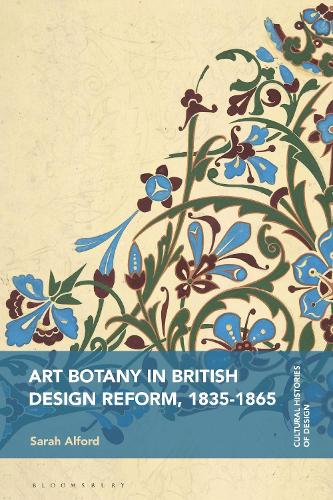
Art Botany in British Design Reform, 1835-1865
(Hardback)
Publishing Details
Art Botany in British Design Reform, 1835-1865
By (Author) Sarah Alford
Bloomsbury Publishing PLC
Bloomsbury Visual Arts
9th January 2025
United Kingdom
Classifications
Professional and Scholarly
Non Fiction
Botanical arts
Material culture
Botany and plant sciences
Illustration
701.05
Physical Properties
Hardback
224
Width 160mm, Height 236mm, Spine 20mm
660g
Description
Drawing on the fields of design history and the history of science, this book examines the important role that botanical science played in the emergence of Victorian design theory. In early 19th-century Britain, a rapid influx of plants from other countries began to confuse the orders of classification. As these new specimens arrived in nurseries and conservatories, botanists revised and promoted a new taxonomy: the Natural System. In parallel, in 1835, British manufacturers faced a government inquiry in order to improve the output of the British design industry. They needed a nationally identifiable design aesthetic and the inquiry led to the creation of the Government Schools of Design and the Design Reform movement. This book explores how, whilst botanists used drawings to clarify new systems of plant classification, designers learnt art botany, the practice of basing decorative form and ornament on the hidden, natural laws that govern plant growth and structure. Design reformers used botany as a model for how to create and identify what is new and incorporate it into what was already familiar and meaningful, all within the purview of developing a professional field of practice. Sarah Alford provides a rich, interdisciplinary study of how the fields of design and botanical science came together. Through a framework of material culture, Alford sheds new light on the work of leading botanists, designers and illustrators such as Sarah Drake, John Lindley, Richard Redgrave, Owen Jones and Christopher Dresser. This book reveals how the designation of what design reformers deemed appropriate for the surface decoration of material structures as varied as carpets, jugs, wallpaper, and furniture, was an embrace of botanical science as a source of fantasy and imagination.
Reviews
Increasing imports of exotic plant species in Victorian Britain produced a flux in the scientific classification of plants which mirrored similar flux over the role of design and representation of plants. This clearly written wonderful book tells that story through focus upon four pieces of science, art and design. * Paul Ashton, Edge Hill University, UK *
A lively, engaging, and occasionally witty history of the surprising relationship between botany, industrial design, and civil society in nineteenth century Britain. * Susan Tomlinson, Texas Tech University, USA *
Author Bio
Sarah Alford is Assistant Professor of Craft History and Theory at Alberta University of the Arts, Canada, specializing in 19th-century craft and design history. She has presented at the College Art Association conference and the Canadian Craft Biennial, and has had writing published in the Journal of Design History.
